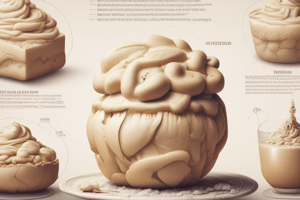Podcast
Questions and Answers
Maintaining body temperature is not one of the crucial bodily functions impacted by hydration.
Maintaining body temperature is not one of the crucial bodily functions impacted by hydration.
False (B)
Dehydration can increase the risk of joint and tissue injuries due to lack of lubrication.
Dehydration can increase the risk of joint and tissue injuries due to lack of lubrication.
True (A)
Staying hydrated has no effect on regulating blood pressure.
Staying hydrated has no effect on regulating blood pressure.
False (B)
Hydration has no impact on cognitive function during physical activities.
Hydration has no impact on cognitive function during physical activities.
High intensity exercise requires less water to maintain proper hydration levels.
High intensity exercise requires less water to maintain proper hydration levels.
Low temperatures do not affect the body's need for water during physical activities.
Low temperatures do not affect the body's need for water during physical activities.
Longer exercise sessions require less water to maintain hydration.
Longer exercise sessions require less water to maintain hydration.
Individuals with higher levels of body fat need less water to maintain hydration.
Individuals with higher levels of body fat need less water to maintain hydration.
Drinking water before, during, and after exercise is not recommended for maintaining hydration.
Drinking water before, during, and after exercise is not recommended for maintaining hydration.
Sports drinks with electrolytes are not helpful in replacing lost electrolytes during physical activities.
Sports drinks with electrolytes are not helpful in replacing lost electrolytes during physical activities.
Thirst is not a reliable indicator of hydration levels.
Thirst is not a reliable indicator of hydration levels.
Excessive caffeine and alcohol consumption do not contribute to dehydration during physical activities.
Excessive caffeine and alcohol consumption do not contribute to dehydration during physical activities.
Flashcards are hidden until you start studying
Study Notes
Hydration is essential for maintaining optimal physical performance and overall health, especially during physical activities. Staying hydrated ensures that the body's vital functions, such as temperature regulation, nutrient transport, and waste removal, are carried out efficiently. This article explores the importance of hydration for physical activities and provides practical tips for maintaining proper hydration levels.
Importance of Hydration
Hydration is crucial for various bodily functions, including:
- Maintaining body temperature: Water helps regulate the body's temperature during physical exertion.
- Transporting nutrients and oxygen: Fluids are used to transport nutrients, oxygen, and waste products throughout the body.
- Lubricating joints and tissues: Water is essential for the lubrication of joints and tissues, which reduces the risk of injury.
- Regulating blood pressure: Maintaining proper hydration helps regulate blood pressure and prevent dehydration-related health issues.
Being adequately hydrated also enhances cognitive function and mood, making it easier to focus during physical activities.
Factors Affecting Hydration During Physical Activities
Several factors can impact hydration levels during physical activities:
- Exercise intensity: The more intense the exercise, the more water is needed to maintain proper hydration levels.
- Environment: High temperatures and humidity can increase the body's need for water.
- Duration of exercise: Longer exercise sessions require more water to maintain hydration.
- Physical condition: Individuals with higher levels of body fat tend to need more water to maintain hydration.
Strategies for Maintaining Hydration During Physical Activities
To stay hydrated during physical activities, consider the following tips:
- Drink before, during, and after exercise: Aim to drink water before, during, and after physical activities to maintain hydration levels.
- Choose the right fluids: Water is usually the best choice for maintaining hydration during exercise. However, sports drinks with electrolytes can help replace those lost through sweat.
- Monitor your thirst: Thirst is a good indicator of hydration levels. Drink when you're thirsty, and don't wait until you're dehydrated.
- Adjust fluid intake based on environmental factors: Drink more water in hot, humid conditions or during intense exercise.
- Avoid excessive caffeine and alcohol: Both can dehydrate the body, so limit consumption before and during physical activities.
Conclusion
Hydration is essential for maintaining optimal physical performance and overall health, especially during physical activities. Proper hydration levels ensure that the body's vital functions are carried out efficiently, and cognitive function and mood are enhanced. By following the strategies outlined in this article, you can maintain proper hydration levels and maximize your performance during physical activities.
Studying That Suits You
Use AI to generate personalized quizzes and flashcards to suit your learning preferences.




